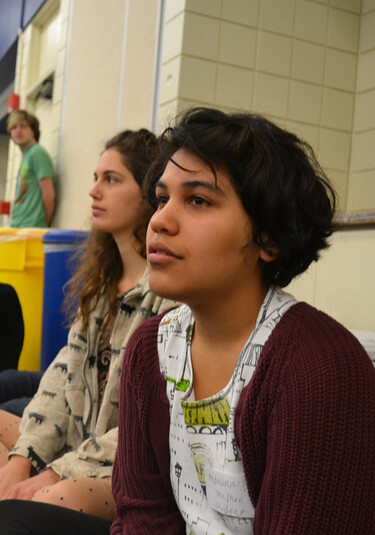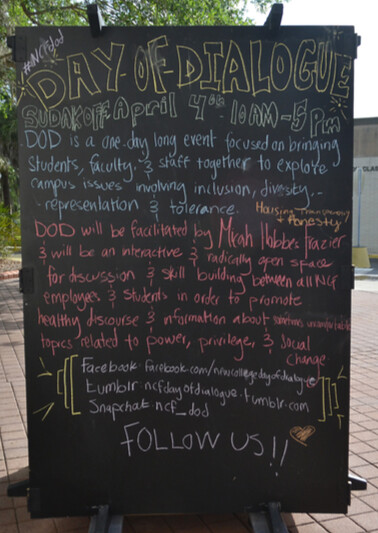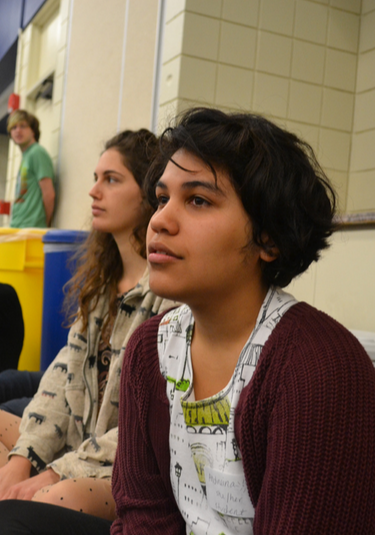
There have been recent efforts among faculty and students to create more dialogue on campus. Planning efforts for the next Day of Dialogue have begun as professors brainstorm on how to bring dialogue to campus.
During the Faculty Meeting on Sept. 14, Professor of Music Maribeth Clark created a motion to set aside the first day of spring classes for a “Day of Dialogue.” Professor of Sociology Sarah Hernandez seconded the motion. Discussion followed and several professors confessed concerns about cancelling classes for the first day of the spring semester and disrupting the class schedule.
“It should not be one day, but instead it should be part of everyday,” Hernandez said in the minutes from the meeting. “But at this moment students have a sense of urgency. The work of last year needs this follow up.”
“This is coming from students and the president of the New College Student Alliance (NCSA),” Clark said in the minutes. “The motion seeks to support students in their desire to make New College a better place.”
The motion passed, but barely. Out of the faculty members present, 25 voted yes, 23 voted no and two abstained from voting.
“I think what it shows is that people really care about their teaching here […] they’re voting for the academic experience in the classroom,” Clark said. “There’s no reason we should impinge negatively on classes but we also need programming that acknowledges that our campus climate can be improved.”
“The problem with diversity on campus is not just a student problem, this is also a faculty problem, this is also an administration problem, this is also an institutional problem,” third-year and Vice President of Diversity and Inclusion Leen Al-Fatafta said. “This doesn’t really surprise me because we don’t make an effort to prioritize diversity on our campus so naturally when people are asked to prioritize diversity they find that abnormal. They’re going to say no because they feel like there’s no need for it because we never speak of how badly this place needs it.”
Day of Dialogue was an all-day event last year that was committed to creating and encouraging dialogue. The event was in part a response to several issues that had happened on campus, including the posters created by Carlos Marcio Ramirez that threatened sexual assault and the two student arrests relating to drug possession that had occurred during the fall semester. These events were divisive among students and administration and created long forum threads. Many students felt that there had not been enough of a response to these events from administration and hoped the day would help with this.
However, the organizers this year say that just because there has not been a campus-wide issue yet does not mean Day of Dialogue does not need to happen.
“I think there’s a tradition of using these kinds of events as a response to problems,” Clark said. “What I would love to see is us think about these kinds of events as prohibition against problems.”
As Day of Dialogue planning moves forward organizers hope to do a few things differently this year. NCSA co-President Miles Iton has created the Student Dialogue Committee to help plan and organize student efforts more efficiently.
“I think in some ways [Day of Dialogue] was very successful and in some ways it replicated a lot of the frustrations that people feel on a regular basis at New College because we are part of the college as we work to do anything,” Clark said. “We bring the old patterns that we want to break at the same time that we’re working towards doing something differently.”
Iton hopes to make the conversation at this year’s Day of Dialogue more pertinent to problems New College is facing, like the forum and call out culture. Iton, who was involved in the event last year, said several student organizers felt that they did not get to talk about things they hoped the event would address last year.

“Speaking from a lot of student organizers’ side, especially the students of color, it [Day of Dialogue] felt a lot like conversations that we’d been having at every other diversity event, which is how do we make white people cope with talking about whiteness even when we’re talking about whiteness in contention with other identities,” Iton said. “As much as that is something that needs to be heard it was really disheartening for us as students of color to put all our energy into throwing this one event and having conversations that we really wanted to happen float by the wayside because we had to stop and still address like, ‘Oh we don’t mean to hurt your feelings.’”
Clark added that picking one specific topic for the day, like racism or ableism, might lead to more productive conversation.
“Last year we were kind of concerned about saying what [Day of Dialogue] was about […] and so we kept it very open and that was probably to the detriment of really focusing on something,” Clark said. “I hope that this year we can figure out what we’re really focusing on and maybe have a more satisfying experience for some people.”
Iton plans to hold a Real Talk event with the NCSA as a precursor to Day of Dialogue where students can talk to NCSA members as just students and not worry about the calculated communication of e-mail.
“It’s going to be a very loose dialogic event,” Iton said. “[It’s] a precursor to Day of Dialogue in that you can have an event where we all come together, talk with each other and try to manage it well.”
Al-Fatafta has been working on organizing diversity workshops to lead up to Day of Dialogue. However, student affairs professionals have asked to postpone an event that was set for Oct. 31.
“Our fear is that we don’t want to organize things just to organize them, just to have a diversity event,” Al-Fatafta said. “We want whatever we organize to be educational and potentially transformative for the audience it attracts.”
Al-Fatafta, along with Counseling and Wellness Center (CWC) counselor Duane Khan and Health Educator Thelma Santiago, hope to organize an action forum where different student groups and committees come together to fill each other in on current organizing efforts. She hopes this will better communication on campus.
This past summer, Professor of Sociology Queen Zabriskie, Professor of Spanish Language and Literature Sonia Labrador Rodriguez, Clark and Iton attended the National Intergroup Dialogue Institute at University of Michigan Ann Arbor. The three day workshop is hosted annually by the university’s intergroup relations program to teach others the philosophy and techniques of their intergroup dialogue institute for the purpose of creating such programs on other campuses.
The conference inspired Clark to work on instituting a program on campus that would provide sustained dialogue over time, comprised of students and run by students. Clark and Hernandez are working on creating an Independent Study Project (ISP) for first year students based on the curriculum.
However, Clark wants the program to be interspersed throughout all of campus, much like a good writing program. She hopes to bring many of the teachings to Day of Dialogue.

